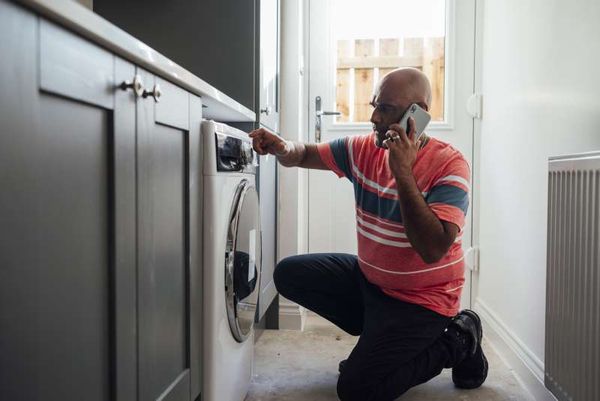
At a Glance:
How to Identify Washing Machine Issues
Should You Repair or Replace Your Washing Machine
4 Replacement Washing Machine Suggestions
A washing machine is an essential appliance in any home, but when it starts making unusual noises—especially a high-pitched squealing sound—it can be a sign of trouble. While some noises may be harmless or easily fixed, others could indicate serious mechanical issues that require immediate attention.
If your washer has recently started squealing, don’t ignore it. Understanding what’s causing the noise can help you determine whether a simple repair will do the trick or if it’s time to start shopping for a replacement. In this guide, we’ll break down the common causes of washing machine squealing, when a repair is worth it, and what to consider if you need a new washer.
Reasearch Your Next Washer at Plaza Appliance
If your washer is having issues and you are considering a replacement, be sure to check Plaza Appliances' large selection to find the best options.
Browse Our Washer CatalogWhen Washing Machine Squealing Signals Serious Problems
A squealing washing machine can be a frustrating experience, especially when you don’t know what’s causing the noise. While some sounds might not be too alarming, a persistent squeal can be a red flag for a more serious issue. Let’s explore the common causes of washing machine squealing, how to troubleshoot the problem, and when to decide if it’s a quick fix or a major repair.
Common Causes of Washing Machine Squealing
- Worn-Out Belts: Over time, the belts that drive the drum can become worn, stretched, or loose, causing a squealing sound when the washer is running. This is one of the most common causes of a squeaking or squealing noise, and it’s usually a relatively simple fix.
- Motor Issues: The motor could be the source of the squealing if it’s struggling to turn the drum. A motor problem can lead to more significant issues down the line, especially if the motor is starting to wear out or overheat.
- Bearing Failure: One of the more serious causes of a squealing washing machine is a failure of the drum bearings. Bearings allow the drum to spin smoothly, and when they start to wear down, they can create a high-pitched squeal. Unfortunately, bearing issues can lead to costly repairs, as it often requires disassembling parts of the washer to replace them.
How to Troubleshoot the Problem
- Listen to the Sound: If the squealing noise happens during the spin cycle or agitation, it could be related to the belt or motor. If the sound is more constant, even during the washing or rinsing cycle, it’s more likely to be the bearings.
- Location of the Noise: Try to pinpoint where the squealing is coming from. If it’s coming from the bottom of the machine, near the motor or belt area, it’s likely a worn belt. If the noise seems to come from the drum or the spinning area, you may be dealing with bearing failure.
- Minor Fix: If the squealing is caused by a worn belt, this is usually an easy fix. Replacing the belt is a low-cost solution and doesn’t require major parts replacement.
- Major Repair: If the problem lies in the motor or bearings, the repair can be more complicated and costly. Motor issues or bearing failure typically require professional assistance, and in some cases, it might be more cost-effective to replace the washing machine rather than repair it.
When a Squealing Noise Signals a Minor Fix vs. Major Repair
If you’re hearing squeaking or squealing from your washer, try to diagnose the issue based on where the sound is coming from and when it occurs. In many cases, early detection of the problem can help you save on repair costs. However, if it’s something more serious, it might be time to consider investing in a new machine.
Learn More: Energy Star Washer Selection: 7 Reliable Picks
Should You Repair or Replace Your Washing Machine?
When your washing machine starts acting up, one of the biggest decisions you'll face is whether to repair it or replace it. While some minor issues can be fixed without breaking the bank, other problems may signal it's time for a new washer. Let’s explore the cost analysis, how the age of your machine plays a role, and when replacing your washing machine might be the best option.
Cost Analysis: When a Repair Is Worth It vs. When a Replacement Makes More Sense
- Repair Costs vs. New Machine Costs:
One of the first things to consider is the cost of repair compared to the price of a new washing machine. If the cost of repairing your washer is 50% or more of the price of a new one, it might be time to invest in a new appliance. For example, if the repair costs for motor or bearing replacement are high, it could make more sense to buy a new washing machine, especially with new models offering better efficiency and updated features.
- Long-Term Savings:
Repairing a washing machine might offer short-term savings, but if your washer is old and inefficient, you could end up paying more in utility bills over time. New washing machines, especially ENERGY STAR-rated models, are more energy-efficient and can save you money on water and electricity in the long run.
Age of the Machine: How Long Do Washing Machines Typically Last?
Washing machines typically last between 10 to 15 years, depending on the brand and how often you use it. If your machine is nearing or beyond this age range, repairs might only be a temporary fix. Older models are more likely to experience recurring issues, and you could spend more money on repairs than it's worth in the long run.
If your washer is over 10 years old and facing major issues like motor failure or drum problems, replacing it with a more modern, energy-efficient model could make more sense than pouring money into constant repairs.
Signs That Your Washer Is Beyond Repair and It's Time for an Upgrade
- Frequent Breakdowns:
If your washer is constantly breaking down and needing repairs, it may be a sign that it's reached the end of its useful life. While one repair might be worth it, ongoing issues are often a signal to replace the unit.
- Increased Repair Costs:
As washing machines age, parts can become harder to find, making repairs more expensive. If you're faced with high repair costs for a model that's already several years old, replacing the machine might be a better option.
- Inefficiency:
Older washing machines tend to be less energy-efficient. If your machine uses more water and electricity than newer models, upgrading to an ENERGY STAR-rated washer could save you more in the long run, even if the initial investment is higher.
Scratch & Dent Washing Machines: A Smart Replacement Option?
If you’re looking to save some money on a new washer, consider checking out scratch & dent washing machines. These units are often heavily discounted due to cosmetic imperfections but still perform just as well as brand-new models. It’s a great option if you're on a budget and looking for an affordable replacement without compromising on quality.
Ultimately, the decision to repair or replace your washing machine depends on the severity of the problem, the age of the unit, and the long-term costs. If you find yourself facing repeated issues or a major breakdown, it might be time to consider upgrading to a new machine. And remember, scratch & dent washing machines can offer the perfect solution for getting a great deal while still getting the reliability you need.
Learn More: Why Do Your Clothes Smell After Washing?
4 Replacement Washing Machine Suggestions
If you've decided that it's time to replace your washing machine, you're in luck! There are plenty of excellent options on the market that can suit your needs. Here are four great replacement washing machines, each offering unique features and performance to keep your laundry days running smoothly.
1: Whirlpool 4.7 Cu. Ft. White Top Load Washer (WTW5057LW)
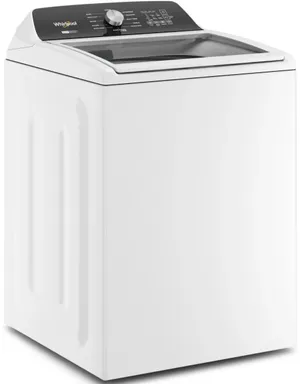
Whirlpool White Top Load Washer
For those who prefer a top-load washer, the Whirlpool 4.7 Cu. Ft. White Top Load Washer is an excellent choice. This washer offers a spacious drum, perfect for larger loads, and features Whirlpool’s Adaptive Wash technology that adjusts the wash action, water levels, and cycle time to ensure optimal cleaning. It also boasts a Quiet Wash system to reduce noise, making it ideal for families or homes with laundry rooms close to living spaces.
Key Features:
- Adaptive Wash technology
- Large capacity for bigger loads
- Quiet operation
- Multiple wash settings for customized cleaning
2: GE 4.8 Cu. Ft. Smart Front Load Washer (GFW550)
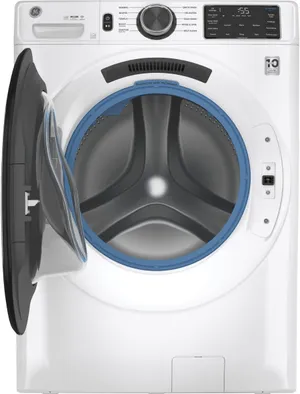
GE White Smart Front Load Washer
If you're looking for a high-tech upgrade, the GE 4.8 Cu. Ft. Smart Front Load Washer is a fantastic option. With smart features like Wi-Fi connectivity, you can control your laundry cycles from anywhere using the GE Appliances app. It also has a Steam function to help eliminate tough stains and sanitize your laundry. The UltraFresh Vent System with OdorBlock technology keeps your washer fresh and prevents mold growth, a great feature for those living in humid climates.
Key Features:
- Wi-Fi connectivity for remote control
- Steam function for deep cleaning
- UltraFresh Vent System to prevent mold and odors
- Large capacity to handle big loads
3: LG 4.5 Cu. Ft. White Front Load Washer (WM4000HWA)
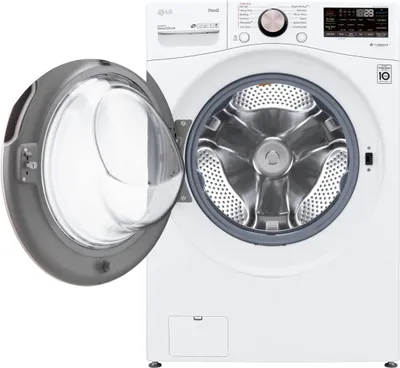
The LG 4.5 Cu. Ft. White Front Load Washer is another fantastic option, known for its efficiency and powerful features. With TurboWash 360° technology, it can clean a full load of laundry in under 30 minutes, perfect for busy households. Plus, with the SteamSanitary cycle, you can sanitize your clothes without the need for hot water, making it perfect for items like bedding and baby clothes.
Key Features:
- TurboWash 360° technology for fast cleaning
- SteamSanitary cycle for sanitizing
- Energy-efficient with ENERGY STAR® certification
- Smart diagnosis for troubleshooting via your phone
4: Speed Queen TR7 3.2 Cu. Ft. White Top Load Washer (TR7003N)
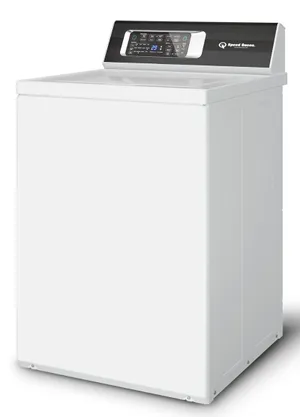
Speed Queen White Top Load Washer
If you're looking for a washer with proven durability and outstanding performance, the Speed Queen TR7 is worth considering. This washer is built to last, with a heavy-duty construction designed to stand the test of time. It features an all-metal transmission and manual controls, ensuring a no-nonsense, reliable laundry experience. The Extra Rinse feature helps remove detergent residue, and the Deep Water Wash cycle is ideal for large or heavily soiled loads.
Key Features:
- Heavy-duty construction
- All-metal transmission for durability
- Extra Rinse and Deep Water Wash cycles for better cleaning
- Simple, easy-to-use manual controls
These four washers offer a variety of features, from energy-efficient designs to high-tech capabilities and long-lasting durability. Whether you’re after smart technology, faster wash times, or a heavy-duty machine that can handle big loads, you’ll find the perfect washer among these top picks. Consider your laundry needs and budget, and you'll be sure to choose the right replacement washer for your home!
Learn More: Whirlpool Front Load Washer Review
FAQ: When Washing Machine Squealing Signals Serious Problems
Why is my washing machine making a squealing noise?
A squealing noise from your washing machine can be caused by several factors. The most common reasons include worn-out belts, a broken motor, or bearing failure. These components are essential to the functioning of your washer, and when they start to deteriorate, they can create a high-pitched squealing sound. It’s important to identify the exact cause early to avoid further damage.
How can I troubleshoot a squealing washing machine?
To troubleshoot the issue, first try to pinpoint the sound’s location.
- If the noise occurs during the spin cycle, it’s often due to worn bearings or an issue with the drum.
- If the squeal happens when starting the wash or during agitation, it might be the drive belt or motor causing the noise.
- Check for any visible signs of damage, and consult a professional if the issue isn’t easily fixable.
Should I repair or replace my washing machine if it’s squealing?
If the squealing noise is a result of a minor issue, such as a loose belt, repairing it might be a cost-effective solution. However, if the noise is due to more serious problems like motor failure or bearing damage, and your washer is over 7-10 years old, it might be time to consider replacing it. Repairs can often be expensive, and sometimes investing in a new washing machine is a better long-term solution.
Why Trust Plaza Appliance Mart?
Plaza Appliance Mart is a local, family-owned, appliance store in North Carolina where you can get personalized, expert service that you won’t find at the big box stores. Plaza Appliance Mart is YOUR source for competitive prices with knowledgeable in-store professionals here to help you every step of the way, whether you need to replace an old appliance, or if you're remodeling and need an entire kitchen full of new brand-name products. And, our delivery and installation specialists will assure that your new appliances arrive safely and are installed properly.
If you were to ask the employees at Plaza Appliance Mart about their roles in the company, they'd say they're not just employees, they're family. So as you might imagine, a team of professionals like this who are already so tightly knit and bonded together make for a perfect partner with the Ronald McDonald House of Charlotte. Apart from their community ties, Plaza Appliance is an accredited Better Business Bureau company with an A+ Rating.
Shop Washing Machines at Plaza Appliance Mart
Stop by Plaza’s Charlotte, Huntersville, Matthews, or Pineville locations to see what a difference buying local with an experienced staff can make. Or shop Washing Machines online! Our friendly experts are always happy to help you find your next washing machine — whether you call us at 704-568-7600, use our online chat feature, or visit us in person.